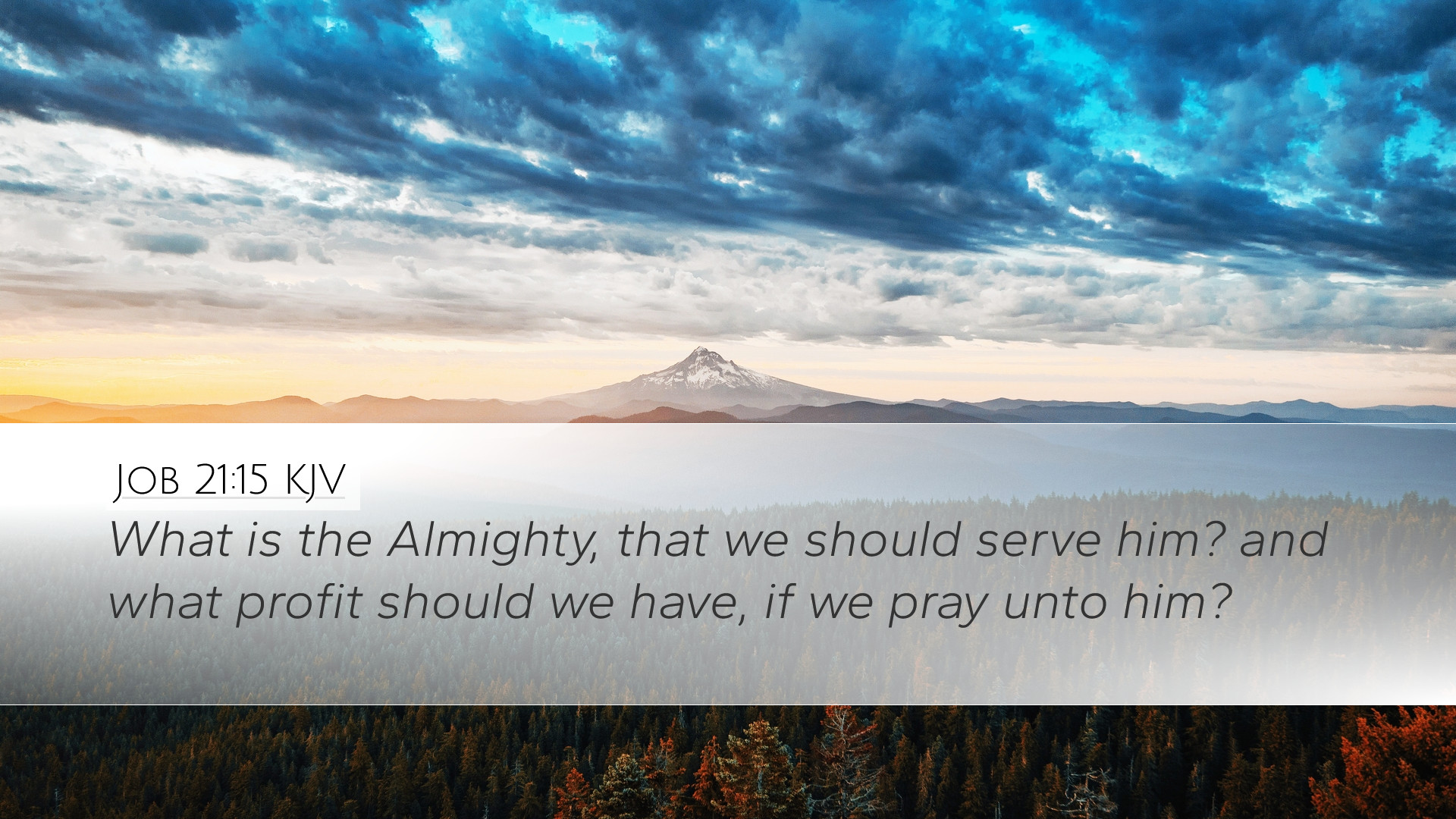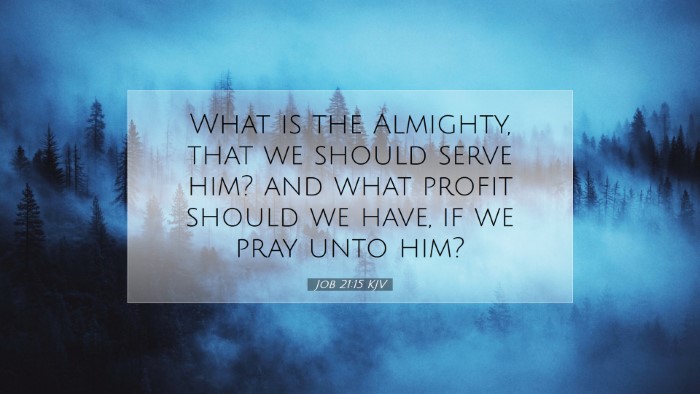Commentary on Job 21:15
Bible Verse: Job 21:15 - "What is the Almighty, that we should serve him? and what profit should we have, if we pray unto him?"
Introduction
This verse encapsulates a pivotal moment in the discourse of Job, illustrating both his deep struggle with understanding divine justice and the seemingly unanswered question regarding the efficacy of serving God. As we dissect this verse, insights from classic public domain commentaries by Matthew Henry, Albert Barnes, and Adam Clarke will provide a rich tapestry of interpretation, which can be vital for pastors, students, theologians, and scholars alike.
Contextual Background
Within the narrative of the Book of Job, Job is a figure of profound suffering and loss. Having endured unwarranted calamities, Job grapples with the traditional understanding of retributive justice, a core belief of his contemporaries. This verse comes in a larger context where Job responds to his friends, who advocate for a direct relationship between sin and suffering. Job challenges this notion by questioning the benefit of piety in the face of apparent prosperity of the wicked.
Commentary Insights
Matthew Henry's Perspective
Matthew Henry emphasizes the emotional anguish in Job's declaration. He interprets Job's words as a reflection of disillusionment with the prevailing religious notions that equate suffering with divine disfavor. Henry notes that Job’s question, "What is the Almighty?" stems from a place of frustration, suggesting that in his misery, the concept of God seems abstract and ultimately unresponsive to human plight.
Henry further elucidates that Job views the worship of God as potentially without tangible rewards when one observes the prosperity of the wicked. This perspective invites believers to consider the motivations behind their worship and serves as a critique of any transactional understanding of faith. Henry encourages readers to recognize that true devotion transcends the mere quest for personal gain.
Albert Barnes' Interpretation
Albert Barnes provides a detailed exploration of Job’s rhetorical question. He argues that Job’s inquiry reveals a skepticism about the character of God and the outcomes of faithfulness. Barnes notes that Job does not deny God’s existence; rather, he is questioning the nature and implications of that existence in relation to personal suffering.
Barnes emphasizes the importance of understanding God's sovereignty and justice. He highlights that the question "What profit should we have?" challenges the notion of rewards in this life, aligning with the psalmists' reflections on the fleeting nature of earthly success versus the eternal weight of divine justice. Barnes posits that Job persists in advocating for a relationship with God independent of material profit, pointing toward a more profound spiritual inquiry.
Adam Clarke's Contributions
Adam Clarke adds an additional layer to the commentary by discussing the implications of Job’s challenge to God’s authority. Clarke observes that Job's complaint signifies a crisis of faith, provoking a deeper exploration of the rationale behind God's actions and the perceived silence in response to human suffering.
Clarke also tackles the notion of experimental religion, advocating for a faith that is rooted in experience and personal encounter with God's grace rather than mere adherence to a belief system that seeks immediate reward. He encourages a view of suffering that invites believers to seek meaning beyond justice and retribution, thus promoting a richer understanding of divine relationship.
Theological Implications
The inquiries posed in Job 21:15 raise essential theological questions surrounding the nature of God, justice, and human suffering. This verse invites reflection on several points:
- The Nature of God: What is God’s role in human suffering, and how should believers understand His character in light of injustice?
- Divine Justice and Retribution: The challenges posed by Job provoke discussions about retributive justice and lead to exploring the grace that transcends punishment.
- Purpose of Prayer and Worship: The verse compels believers to evaluate the motivations behind their relationship with God, urging a move from self-serving prayer to a genuine pursuit of divine connection.
- Human Experience: Job’s plight resonates deeply, reminding readers that suffering can be a vital stage in spiritual growth and understanding of God's presence.
Conclusion
Job 21:15 serves as a significant theological anchor amidst the complexities of suffering, reward, and the human relationship with God. Drawing from the insights of Matthew Henry, Albert Barnes, and Adam Clarke, this commentary highlights the profound questions of faith that arise when believers face adversity. It emphasizes the importance of seeking God beyond mere transactional faith, recognizing the depths of divine justice, and valuing the transformative power of suffering. For pastors, students, and scholars, engaging deeply with this text encourages a robust exploration of one’s faith and invites ongoing dialogue about the nature of God amidst the complexities of human experience.


